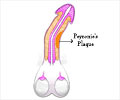Instead of increasing the frequency, couples should work on creating an environment that sparks their desire and makes the sex that they do have even more fun.

For the study, the researchers recruited couples aged between 35 and 65 years and assigned them into two groups for a three-month period. One study group received no instructions on their sexual frequency while the second group was told to double their frequency of sexual intercourse. The study participants answered questions measuring their health behaviors, happiness levels and the occurrence, type and enjoyableness of sex. The couples in the second study group reported lower sexual desire and a decrease in sexual enjoyment.
However, the researchers hope that the findings of the study can help couples improve their sex lives and raise their happiness levels. They said, "Find the spark first and act later."
Source-IANS














